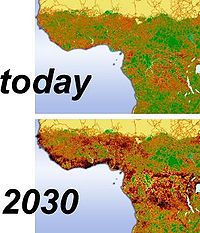
Photo from wikipedia
This paper addresses the problem of minimizing total slot idle time in assigning spectrum to a 2-class traffic, considering both incremental and dynamic arrival and permanence rules. Deadlock avoidance under… Click to show full abstract
This paper addresses the problem of minimizing total slot idle time in assigning spectrum to a 2-class traffic, considering both incremental and dynamic arrival and permanence rules. Deadlock avoidance under incremental traffic is first shown to be possible with the use of non-greedy spectrum assignment policies in some link states which are identified from knowledge of the connection request sizes, thus keeping total idleness finite and minimal. Then, the concept of deadlock avoidance is extended to dynamic traffic with the purpose of proposing an algorithm that mitigates fragmentation losses with appropriate greedy traffic-aware assignment policies. Since deadlock is not permanent under dynamic traffic, avoidance by assignment denial is not used. Instead, the proposed algorithm is only reluctant to assign dysfunctional, deadlock-prone voids in favour of functional voids if they are available. Other priorities may also apply if multiple searches are allowed.
Journal Title: Photonic Network Communications
Year Published: 2022
Link to full text (if available)
Share on Social Media: Sign Up to like & get
recommendations!